- Home
- Courtney Milan
Hamilton's Battalion Page 2
Hamilton's Battalion Read online
Page 2
They reached a marquee tent with flags stuck in the ground before it. A slight, boyish figure in buff and blue, with a colonel’s sash across his breast, was just going in. Nathan winced as the young man took in the situation and came towards them.
“Who is this, Corporal Jacobs?”
Nathan winced again, this time at Rachel’s alias.
Stepping smartly forward, she stood at attention. “Colonel Hamilton, sir, I have reason to think this man a spy employed by the British.”
Nathan’s expression could probably have been described as a grimace by now. No—what was worse than a grimace? He cringed as Colonel Hamilton gave him a sharp glance.
“What reason is that, Corporal?”
Abruptly, Nathan straightened, eager to hear what she’d say.
She didn’t hesitate. “This man is Nathan Mendelson, known to me from before the war. We shared a faith and a synagogue, and many times I have heard him speak ill of the rebels. When the British occupied New York City and the Patriots among our congregation fled, he remained. As late as a year ago I had news of him working for a supplier to the British troops of that city.”
She’d been listening for news of him? Another fiery rush of unidentifiable feeling.
Hamilton nodded. “Bravely done, Corporal. Has he been searched for weapons?”
“Yes, sir. He carried a pocketknife only.”
“May I have it?”
To Nathan’s surprise, she paused before reaching in her pocket. But she laid the small knife in Hamilton’s palm.
The colonel examined it and then eyed Nathan. “I’d better check him again. If he knows anything, the general will want to hear it immediately.”
Nathan submitted to being searched a second time, wishing Rachel were doing it.
“I commend you for your swift action, Corporal. You may return to your company for parade. On your way, kindly alert the commander of the guard that I have borrowed his sentries.”
“Yes, sir. Thank you, sir.” Again, Rachel paused. “Will you let me know if—I should want to—” She fumbled for words. “If he is to be executed, sir, I should wish to be present, and convey the news to his family.”
Hamilton’s face softened. “If it comes to that, Corporal, I will notify you. You’re dismissed.”
She saluted and marched off without a backward glance. Nathan watched her go, feeling a little panicked. How would he manage to see her again?
“Mr. Mendelson,” Colonel Hamilton said sharply. “If you would be so good.”
Flanked by sentries, Nathan followed the officer, only glancing back nine or ten times at Rachel’s retreating back.
Rachel’s battalion had been ordered to an early mess; they would spend the evening and most of the night providing cover for troops working on the fortifications. Rachel gulped down her food and took hasty leave. She couldn’t possibly leave camp for the night without knowing if Nathan would keep quiet. About her secret, anyway—really quiet would be like wishing for the moon.
She presented her permission to the guards. With a roll of his eyes, one of them unlocked the door to the tiny room serving as Nathan’s cell. “A friend of yours, eh? He hasn’t stopped making noise all day. Will he listen to you if you tell him to shut his mouth?”
Nathan looked up from the pencil drawing he was making on the wall, vibrating with nervous energy. He had a split lip and a reddish, swollen place on his left cheekbone.
“It looks like you boys shut it for him,” Rachel said grimly. “The fair treatment of our prisoners ought to be a shame and an example to our foes.” She plucked the pencil out of Nathan’s hand, trying not to let the heavy shackles on his ankles disturb her. “He’s a spy and you didn’t take his means of writing away? What’s your name, Private?”
The soldier stiffened in surprise.
“Coburn,” Nathan supplied helpfully.
Rachel didn’t look at him. “Is that correct?”
“Yes, Corporal,” Coburn said through gritted teeth.
“Would you like to tell me who struck the prisoner, Mr. Coburn, so I can include it in my report to Colonel Hamilton?”
In the very short time since his appointment to a field command in the Light Division, everyone had been made extremely aware of how the colonel felt about the just treatment of prisoners. Even ones who would probably be hanged. Even though the division was on edge and furious because Colonel Scammell—darling of the light infantry and the only man who could make George Washington laugh until he cried—lay dying at Williamsburg, shot in the back by the British after he surrendered to one of their patrols last week.
“It was him,” Nathan said with edgy cheerfulness.
Rachel couldn’t think about him being executed. He’d probably try to tell the hangman a joke. “I’m ready to hear your side of the story,” she told the sentry.
“He wouldn’t shut up, and he insulted Irish cooking.”
Rachel bit her lip hard to keep from smiling. “He goaded you past the limits of your endurance, I see. Don’t let it happen again. That will be all, Private.”
Coburn went out and shut the door.
“Can I have my pencil back?” Nathan said in Yiddish.
“Of course not,” she snapped in the same language. “What is wrong with you? You spent all day antagonizing armed men while entirely unable to defend yourself because…?”
“Because I had nothing else to do. I can’t even pace in these things.” One of his legs began to vibrate; the shackles made an awful clanking noise. “I tried to buy a book, but the only one any of them knew of the existence of was Pilgrim’s Progress, and I haven’t yet grown that desperate.”
He’d picked the buttons off his cuff. Rachel’s hand went to the needle and thread she carried in her pocket—but she quashed the impulse. “Have you eaten?” Not much better.
He stared at her in disbelief, leg still bouncing. “Have I eaten? Rachel, who cares?” He’d lowered his voice to protect her secret. Did that mean he wasn’t planning to tell? Why not? “You’re alive?”
She shifted uncomfortably. “Obviously.”
“I sat shiva for you,” he said intently. “I said Kaddish for you. I’ve remembered your yahrzeit three times. How can you be alive?”
That startled her. She’d never thought about Nathan mourning her, past the first few weeks. He’d observed the anniversary of her death?
She remembered lighting a candle on her mother’s yahrzeit, tears blurring the flame. Every year at synagogue she’d sobbed brokenly in the women’s gallery, listening to the mourners’ Kaddish being recited below. Had Nathan cried for her?
Well, of course he had, he cried over everything. “I’m sorry, but—”
“Rachel,” he burst out, lurching to his feet, “what if I had remarried?”
Chapter Two
Rachel hadn’t considered that either. Why not? She thought about it now, and didn’t like how much it unsettled her. “Nothing would have happened,” she said anyway. “It’s not as if I was planning to come back.”
Nathan’s eyes nearly popped out of his head. Wrapping his fingers around their opposing thumbs, he muttered a charm against the evil eye. Not the short Yiddish one she’d learned from her mother, but a long one with Hebrew parts. “Don’t say that! Why would you say that?”
Rachel sighed, annoyed both at his superstition and that she’d caught herself staring at his hands in the candlelight. “I didn’t mean it like that. I meant I’d live somewhere else afterwards, with a different name.”
He was uncharacteristically silent. “Oh,” he said at last. “I…” He swallowed. The bruise looked very dark against his cheek. “I would have given you a get.”
She wasn’t sure she believed him. “That would have made your mother too damn happy.” Mrs. Mendelson had been after Nathan to divorce Rachel since a year into their marriage, on grounds of barrenness.
Nathan winced at the profanity. His disapproval felt like a porcupine rolling over her skin. But Rachel was done
trying to be a good wife. He wasn’t the center of her world and his simple assumption that he was—she wanted to shatter it.
“I wasn’t just running away from you. You were already a hundred miles away. I wanted to join the army. I needed to disappear and take a new name. If you’d given me a get, people would have expected to know where I went afterwards.”
“You didn’t take a new name,” he pointed out. “You took your maiden name back.”
“I see your hurt feelings come before everything, as always.”
“You should go,” he said abruptly. “If you don’t, I’ll start shouting and then all your hard work—how did you even do it? My mother said she washed your body—” He stopped short.
She wanted to throw the truth in his face. But somehow she did still shrink from hurting his feelings.
“My mother was in on it.”
She bit her lip.
He put his head in his hands. “Of course my mother was in on it.” His voice was muffled. “You should go.”
She wanted to stay and finish the argument. You’re not his wife anymore, she reminded herself. The siege is what matters. Your comrades need you. You can’t risk it. She rapped on the door.
A different member of the guard answered her summons. Hopefully Coburn was abashed and wouldn’t beat Nathan any more than he already had. She had one foot out the door when Nathan said, “Wait. You said something about eating? I’d love some food. I gave one of them money to buy me dinner and he never came back.”
Rachel’s fist clenched. She could have smashed it into Nathan or the sentry’s face with equal pleasure. “When I come back tomorrow,” she said, loudly enough that everyone in the guardhouse could hear her, “if I hear of one more instance of mistreatment or stealing, I will recommend an immediate court martial. Either give him back his money or give him what you bought with it.”
“The last thing we need is for him to be drunk too,” someone said behind her.
“I know he’s a pain in the ass,” she told them. “Believe me, I’ve known him for years. I know. I know he’s a spy, and a Loyalist, and that he never shuts up. But you are Continental soldiers. Have some goddamned discipline.”
Out of the corner of her eye she saw Nathan wince again at her taking the Lord’s name in vain. Damn him too. He’d been dining with Hessian officers in New York while she was starving in the army. Why should she feed him?
Angrily, she pulled the hunk of bread from her pocket. It gave beneath the pressure of her fingers, not even stale. The light infantrymen had been paid in cash on the march south, their first real wages in months. Her mess had had beef for dinner. Not enough beef—she still wanted the bread. But she marched over and slapped it down on Nathan’s pallet. “Let him eat it, Private. That’s an order.”
Nathan’s hands came away from his face. He looked up at her and opened his mouth. She fled before he could say anything someone might hear.
“Is Pilgrim’s Progress still available?” she heard him ask as the door shut behind her.
October 4
Pilgrim’s Progress was drivel. It was trash. It was an atrocity. Christians were awfully smug about how not only heathens and Jews and so forth but also most of their own friends were bound for hell, weren’t they?
That wasn’t the worst part, though. The worst part was how often the word “wise” appeared in the book. With the long printer’s s, it looked like: wiſe.
Every time Nathan saw it—every time—he thought it said wife. He still had a wife.
His candle was burning low. He would need to light a new one from it soon, before it burned out. A new flame couldn’t be lit on a holiday, and it was the first day of Sukkos.
The guards, shamed by his wife’s reproof yesterday, had actually brought him a little cheese and bread this morning. Fresh from the oven, so he shouldn’t have eaten it on a holiday, but it was probably baked by a Gentile—he abandoned the line of reasoning. A prisoner was permitted some lenience. Besides, it felt like every month this war dragged on made following the mitzvos harder and harder, and less vital too. A pleasant luxury for when you were safe at home surrounded by your friends. Why would HaShem want him to go hungry?
To prove to these goyim that being a Jew meant something, maybe. That it gave Nathan more strength in adversity than mere cheese and bread.
Showing off, then. HaShem did seem to like His followers showing off.
How many mitzvahs was Rachel breaking? She was wearing men’s clothes, to start, and maybe a forbidden mixture of wool and linen at that; she was working on Shabbos; she was lying; HaShem only knew what she was eating; she was taking His name in vain; she was probably taking her hat off indoors and showing her hair—
The candle guttered. He scrambled for the next one, but the windowless room was plunged into darkness before he could light it. Argh, he’d gotten distracted thinking about Rachel and the deep rich brown of her hair. He’d felt so special, back when they were married, when she’d started wearing caps and he’d been the only man she permitted to see her hair.
What did he mean, “back when they were married”? They were still married!
It’s not as if I was planning to come back, Rachel had said yesterday with perfect indifference.
He’d known she didn’t love him when he married her. Her mother was sick and someone had to pay for the doctor. But he hadn’t really loved her either; he’d just liked her enormously. Husbands and wives grew to love each other after the wedding. Not always, of course. But often enough. He’d assumed…he’d hoped…
He’d been desperately in love with her two years later, when the British occupied New York in ’76. It had been a wrench to send her and his mother to safety in Philadelphia while he stayed to protect his job and their little house.
Rachel had asked him to come with them! She’d asked him, and he’d been so flattered he almost went. He’d thought she felt something for him, beneath…everything. Apparently not. And he’d lost the house anyway in the Great Fire just a month later.
Many Loyalists were convinced that fleeing rebels had set the town on fire as the British marched in. Nathan thought it more likely that fires started easily in empty cities.
What hadn’t he lost since this war started? What was left?
Rachel, he reminded himself. That is, you definitely lost her. But she isn’t gone.
So many times he’d imagined her sick and scared and confused with fever, with no one to take care of her who loved her. No one to kiss her forehead or hold her hand or tell her she would make it through this, she just had to fight. He’d thought, Maybe if I’d been there…
But of course Rachel never needed anyone to tell her to fight. She was born fighting.
He’d wasted so much time longing to atone for the pain he’d imagined he caused her, and she’d never spared a single thought for his, if the look on her face when he mentioned her yahrzeit was any indication. All through last night, when he tried to sleep, he kept seeing that blank, surprised look.
Strange that she and his mother had finally found something to agree on: that their marriage didn’t matter at all.
He got to his feet, shuffled awkwardly and loudly across the room in his shackles, and pounded on the door. “Hey! I need a light for my candle. Has your fire been put out since yesterday evening?”
“…And he interrogated us for a quarter of an hour about when we lit our fire,” the sentry finished complaining. “How should I know? It was here this morning from the last watch.”
Rachel sighed. There was no point explaining to them about whatever holiday it must be; probably Nathan already had, in detail. “A quarter of an hour might be an exaggeration, don’t you think?”
“Not by enough,” another soldier muttered.
Nathan’s head jerked up when she came in. He was sitting with his knees pulled up to his chest, perching a book on his shackles. “Have you read Pilgrim’s Progress?” were the first words out of his mouth.
Since her battalion had be
en up most of the night, they had few urgent duties today, but she’d still put off visiting him until late afternoon, dreading what he would say. Planning her answers.
Instead, he said this. “Of course not. Why on earth would I read Pilgrim’s Progress?”
“Boredom, obviously. Desperation.” A British cannon boomed. His mouth spasmed. “This am haaretz Christian abandons his family—because that’s what good goyim do, evidently—so he can go to Heaven without them.”
You abandoned your family, she wanted to say. She crossed her arms silently.
“So he’s walking along on his way to Heaven,” Nathan continued, “and he meets this fellow, Mr. Worldly Wifeman—I mean Wiseman—who tells him that instead of…sorry, I’m not going to go back and explain the whole thing because it’s very boring, but I am going to tell you that Mr. Wiseman is from the town of Carnal Policy.”
The laugh burst from her tightly compressed lips.
He looked pleased with himself even as he wiped a drop of her spit off his cheek and twitched at another cannon blast. Don’t say anything, she told herself. Just don’t say anything.
“What?”
“Carnal Policy,” he repeated.
“That can’t be right.”
He knocked his candle into the straw pallet when he stood, clanking, to show her the book. Rachel righted the candle with a sigh, grinding out the sparks with her boot.
But there it was in black and white: Carnal Policy. “Oy, der goyim,” she muttered.
He laughed, the dark stubble on his jaw catching the light. He hadn’t shaved in a few days, even before his capture. She wondered if it bothered him; Nathan had been particular about a smooth face, even though he blushed and hung his head whenever the rabbi harangued his congregation about their shameful beardlessness.
But that was five years ago now. It didn’t feel like five years since she’d seen him. It felt like yesterday. It felt like he was her husband standing next to her and later they were going to share a bed.

 Her Every Wish
Her Every Wish Midnight Scandals
Midnight Scandals After the Wedding
After the Wedding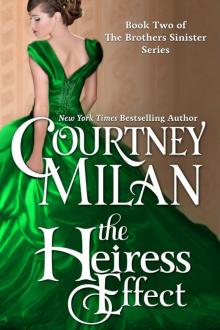 The Heiress Effect
The Heiress Effect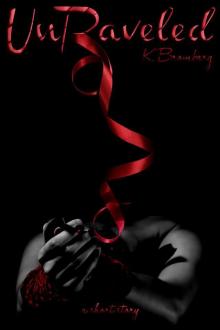 Unraveled
Unraveled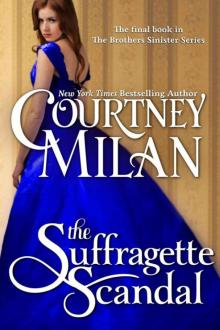 The Suffragette Scandal
The Suffragette Scandal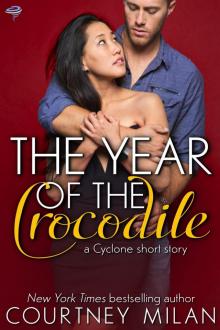 The Year of the Crocodile
The Year of the Crocodile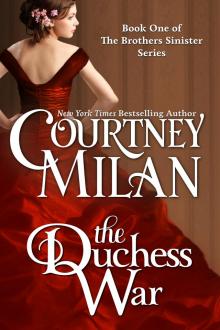 The Duchess War
The Duchess War What Happened at Midnight
What Happened at Midnight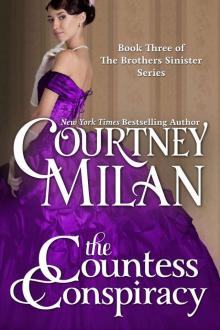 The Countess Conspiracy
The Countess Conspiracy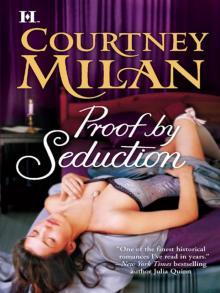 Proof by Seduction
Proof by Seduction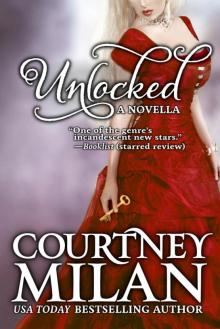 Unlocked
Unlocked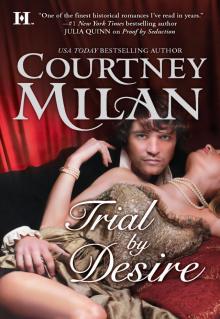 Trial by Desire
Trial by Desire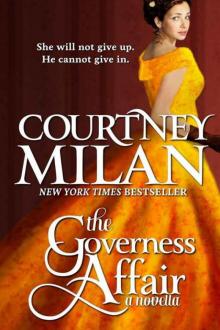 The Governess Affair
The Governess Affair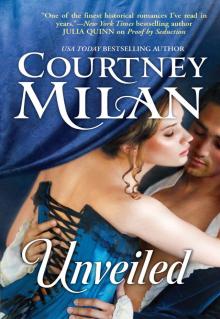 Unveiled
Unveiled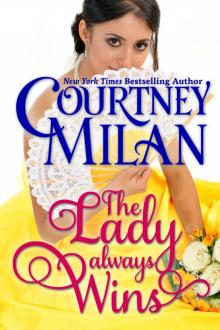 The Lady Always Wins
The Lady Always Wins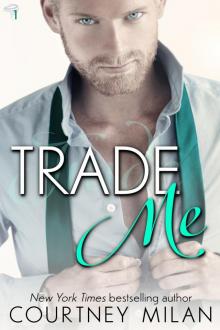 Trade Me
Trade Me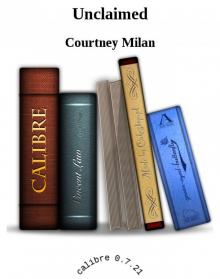 Unclaimed
Unclaimed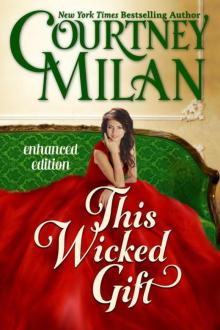 This Wicked Gift
This Wicked Gift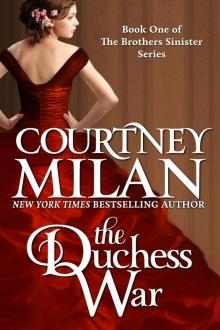 The Duchess War (The Brothers Sinister)
The Duchess War (The Brothers Sinister)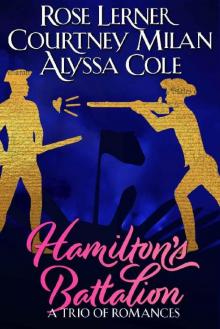 Hamilton's Battalion: A Trio of Romances
Hamilton's Battalion: A Trio of Romances The Turner Series
The Turner Series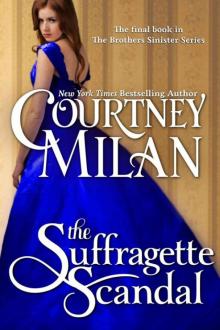 The Suffragette Scandal (The Brothers Sinister)
The Suffragette Scandal (The Brothers Sinister)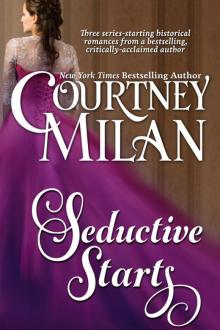 Seductive Starts
Seductive Starts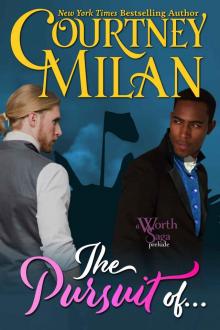 The Pursuit Of…
The Pursuit Of…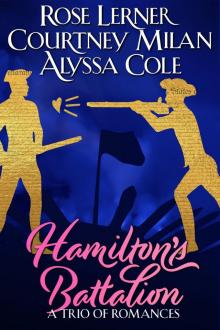 Hamilton's Battalion
Hamilton's Battalion The Carhart Series
The Carhart Series Seven Wicked Nights
Seven Wicked Nights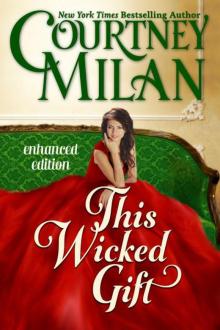 This Wicked Gift (A Carhart Series Novella)
This Wicked Gift (A Carhart Series Novella)